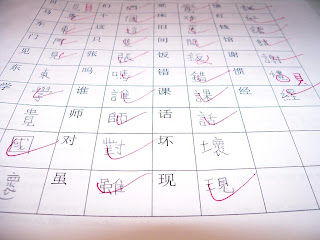![]() Scott and I started class last week on Tuesday, so today marks the 2 week mark for us both. It’s been very intense getting back into the swing of class every day for an hour, at least 1-2 hours of homework a day, and a lot of frustrating knowledge exhuming.
Scott and I started class last week on Tuesday, so today marks the 2 week mark for us both. It’s been very intense getting back into the swing of class every day for an hour, at least 1-2 hours of homework a day, and a lot of frustrating knowledge exhuming.
As I’ve mentioned before, at Oberlin we start out learning traditional Chinese characters and at the beginning of second year we choose whether to stick with trad or move to simp, with most students making the switch. They spent several days (not enough in my opinion!) getting us into the habit of recognizing the simplified characters. I posted a while back about my frustrations with this switch, the whole loss of cleanly defined radical components, the general lack of beauty with simplified script, etc. I have to say though, even after only two weeks, I’m already beginning to appreciate simplified. It’s much, much easier on my hand and even with the loss of many clean and easy mnemonic devices, a 6 stroke character has been a lot easier to retain than a 14 stroke character. Here’s one of the exercises they gave us to help transition, essentially it’s a brief recap of the characters we learned last year that change the most from trad to simp. Our laoshi provides the simplified form and we had to write the trad:
Apart from learning the new characters, we’ve been closely learning the content in A New China, which has an introductory lesson about a foreign exchange student who is nervous about bringing an objectionable magazine through Beijing customs. I’ve been ruminating on the discussion some of you may have been following about the Tyranny of the Textbook.
Going into it, I couldn’t help but wonder, are the words I’m learning (mostly airport and travel related in this lesson) really generally applicable? Are they modern? Are they colloquial? And perhaps most importantly, are they helping me to gain overall skill in the language? The answer that I arrived for most of the questions was “no.” However, I came upon contradictory evidence yesterday morning.
Nick and I generally wake up early and go to the gym. Mondays, Wednesdays, and Fridays are cardio days, weights on Tuesdays and Thursdays. So yesterday at 7:07AM Nick knocked on my door and mumbled “桥山, you waking up for the gym?” (桥山 is my 中文名字.) Half awake, I responded “我忘了 set my alarm!” Only later did I realize how cool that exchange was. I was definitely not fully awake when I responded, and I definitely Chinglished out on the sentence structure, but the fact that I had internalized even basic vocabulary made me feel great. I couldn’t help feeling proud as I huffed and puffed my way to the gym.
So I suppose while I can’t necessarily see how learning vocabulary like 准时, 飞机, and 机场 is a huge help when I can’t even say “restroom” or “toilet,” the immersion has been very valuable. As John over at Global Maverick pointed out, the value of any learning regime can be massively increased by varying your learning material, and I definitely agree. But for someone with limited time and resources, and a well-run Chinese program nearby, I’ll opt for the textbook-based tyranny. The only reason I was able to speak broken Mandarin without having woken up makes me think that even if the content of our textbook is dated, stilted, and non-colloquial, it’s helping me a lot dunk my brain (albeit while it yells and screams) into the proverbial pool of Chinese learning. And to be fair, although the majority of class dialogue has revolved around the lesson vocabulary, Oberlin’s 老师 are very good and don’t rely on rote exercises, so there’s definitely some content variability in my learning.
I do hope the learning gets easier as I become more accustomed to the rigor of the class, but the jolt from summer complacency seems to be working wonders on my language skills.

